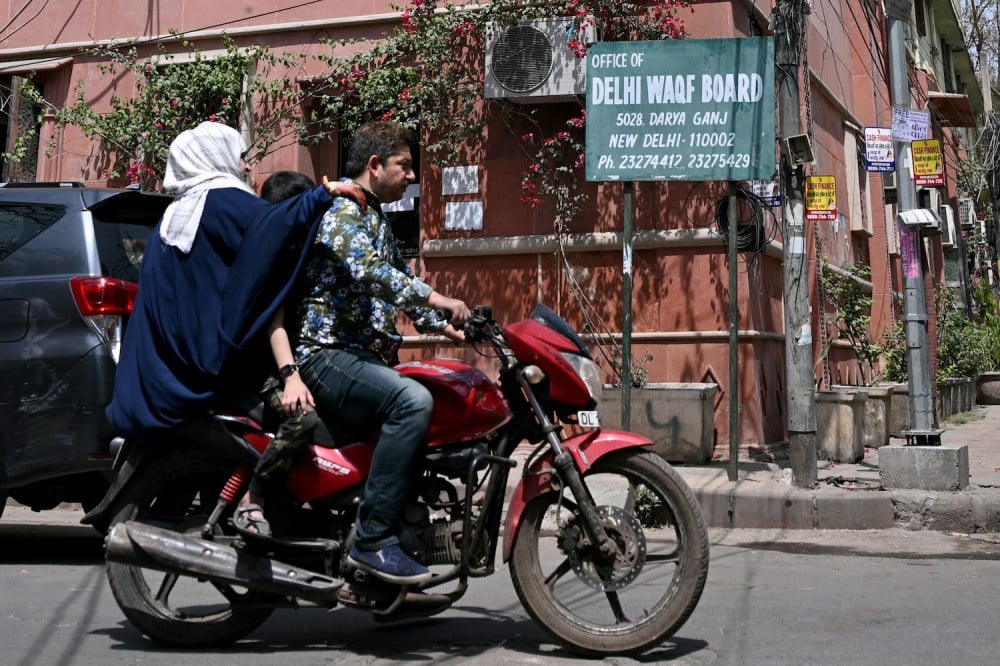The Indian Parliament—led by Prime Minister Narendra Modi’s Bharatiya Janata Party (BJP) and its allies—passed a controversial bill last month that allows the government to determine how Muslim land endowments are governed. Though India’s president ratified it into law a day later, it is currently being challenged in the Supreme Court.
The law could affect thousands of religious or charitable properties across the country, known as waqfs, including mosques, seminaries, and shrines donated by Indian Muslims over centuries. The properties were previously governed by the 1995 Waqf Act.
The new law, which amends the 1995 act, grants New Delhi the power to add non-Muslims to the boards that manage the endowments. It also gives the BJP government a greater role in specifying the ownership status of the land holdings. Though the original Waqf Act recognized properties, including those that lacked formal documentation, the new law opens pathways to dispute the ownership of such properties.
Muslims are the largest religious minority in India, making up 14 percent of the country’s population of 1.4 billion. According to a 2023 report, Indian Muslims had the lowest asset and consumption levels among other major religious groups in the country.
Though the Modi government says that the legislation is designed to eliminate corruption, promote transparency, and ensure that Muslim women get their rightful share of inheritance, it has drawn heavy criticism from the Indian political opposition and the Muslim community, which fears that the Hindu nationalist government may weaponize the law to seize Muslim-owned properties.
Over the last decade, Modi’s leadership has ushered in a surge of Hindu nationalism. One consequence of this trend is that right-wing Hindu groups have increasingly gone to court to claim mosques across India—arguing that they were built on the ruins of Hindu temples.
Last year, Modi consecrated the controversial Ram Mandir in Ayodhya, which was built on the grounds of the Babri Masjid, a 16th-century mosque that Hindu nationalists violently demolished in 1992. The inauguration of the Ram Mandir came after a decades-long campaign to build the temple led by far-right groups. In 2019, India’s Supreme Court ruled that the disputed land must be allotted to Hindus for a temple—and not for a new mosque.
BJP leaders have also tried to reclaim the Taj Mahal, a UNESCO world heritage site, as a Hindu temple, attempting to erase its Mughal legacy and portray it as a symbol of Hinduism instead.
By amending the 1995 law, many Indian Muslims say that the BJP has taken another step toward making them second-class citizens—taking their ancestral property to further the party’s political agenda.
The All India Muslim Personal Law Board, a prominent Muslim organization, has protested the new waqf law, calling it “discriminatory, communally motivated, and a blatant infringement on the constitutional rights of Muslim citizens.”
“This will make Indian Muslims stand in queues to prove the ownership of the property bestowed on them by their forefathers,” said Mohammed Taufeeq, a waqf board member from the western Indian state of Gujarat.
In March 2024, the state government in Gujarat, a BJP stronghold, demolished an Islamic shrine in the city of Junagadh during a late-night operation amid heavy police deployment. In September, the state authorities also demolished nine Islamic structures. In November, a civil court in northern India issued a notice claiming that the Ajmer shrine—one of the most revered Sufi Muslim shrines in India—was originally a Hindu temple. The petition was filed by Hindu Sena, a Hindu extremist organization.
In addition to the razing of Islamic sites, local state and city authorities have also renamed monuments, streets, and cities with Muslim-sounding names. In 2018, the iconic city of Allahabad, in the northern state of Uttar Pradesh, was renamed Prayagraj after the state government—led by firebrand Hindu monk Yogi Adityanath—said that the move would restore the city’s ancient identity as a Hindu pilgrimage center. This Hindu renaming trend has been seen in other BJP-ruled states, such as Madhya Pradesh, Gujarat, and Maharashtra.
Many Muslims in India fear that if such registered Islamic shrines were vulnerable even before the new law, land endowments will now be open to further scrutiny. Another issue causing anxiety is that the legislation could diminish the role and control of Muslims in managing waqf properties. According to national government estimates, there are more than 870,000 waqf properties across India, worth more than $14 billion.
Zafarul Islam Khan, the former president of the All India Muslim Majlis-e-Mushawarat, the umbrella body of Muslim organizations in India, said that the changes to the 1995 Waqf Act open the floodgates for both the national and state-level governments—as well as individuals—to “usurp waqf lands and properties,” including those that serve the most vulnerable members of the Muslim community, such as the poor, widows, or orphans.
The new legislation is not the BJP’s first attempt to modify laws that directly affect living conditions for India’s Muslims, and right-wing Hindu groups and state authorities have previously attempted to desecrate Islamic shrines and mosques. But weaponizing the law on a nationwide scale has drawn flak from Muslims across India, who are currently protesting against the law. Since the legislation passed, protests over the waqf amendment have resulted in at least three deaths and more than 150 arrests across India.
Over the last decade, the BJP has also pushed for a National Register of Citizens (NRC), which aims to identify and deport undocumented immigrants; made changes to its citizenship laws; abolished the Islamic concept of triple talaq, or instant divorce; and stripped the special autonomous status of Kashmir, India’s only Muslim-majority region. All of this legislation has undermined the constitutional security of Indian Muslims.
The so-called Hinduization of India gained further traction after Modi’s election victories in 2019 and 2024. His government’s track record of targeted harassment of Muslims has been acknowledged by the U.S. Commission on International Religious Freedom, which has accused New Delhi of enacting laws that could expose millions of Indian Muslims to detention, deportation, or statelessness if the government completes the NRC.
The Waqf Amendment Act will undermine the idea of a secular India and strain the social contract under which Indians, including religious minorities, have lived for decades. The BJP government has time and again deployed its parliamentary majority or cited national security concerns as a way to promote its Hindu-nationalist agenda.
In Indian-administered Kashmir as well, worries abound about the new waqf law. “We view the Waqf Act as another attempt at sabotaging our religious freedom and the autonomy of our institutions. Muslims of Jammu and Kashmir see it as an assault on our religious institutions,” Mirwaiz Umar Farooq, Kashmir’s head cleric, told Foreign Policy.
The BJP and its allies are selling this amendment as a move to root out corruption and empower women. But to many Muslims, the law appears to be a calculated attempt at disenfranchising and disempowering Muslims, dissolving their status as equal Indian citizens.
The post In India, Controversial Law Threatens Muslim Property appeared first on Foreign Policy.




